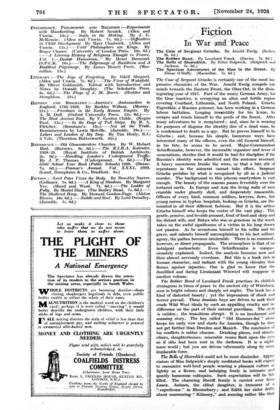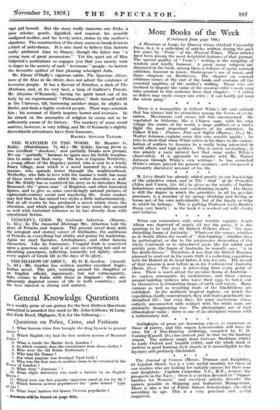Fiction
In War and Peace
The Case of Sergeant Grischa is certainly one of the most im- pressive chronicles of the War. Arnold Zweig compels our minds towards the Eastern Front, the Ober-Ost, in the disin- tegrating year of 1917. Part of the weary German Army, for the time inactive, is occupying an alien and fertile region covering Courland, Lithuania, and North Poland. Grischa Paprotkin, a Russian prisoner, has been working in a German labour battalion. Longing irresistibly for his Lome, he escapes and trusts himself to the perils of the forest. After many adventures he is recaptured ; and, since he is wearing for purposes of disguise the identity disc of a dead man, he is condemned to death as a spy. But he proves himself to be Grischa ; and, because his simple, humorous ways have interested many of the officers, even the old General himself, in his fate, "be seems to be saved. Major-Commandant Sehieffenzahn, however, the inexorable organizer and lover of annexations, decides that it would be bad for discipline if the Russian's identity were admitted and the sentence reversed. A heavy snowstorm breaks the wires, so that a late stir of repentance in the autocrat cannot take effect. Sergeant Grischa perishes by what is recognized by all as a judicial murder. The background to this piteous martyrdom is vast enough. The beauty of the seasons passes feverishly over the tortured earth. In Europe and Asia the living walls of men crumble under ghastly shell, and desperately reassemble. Officers of every kind, common soldiers, lawyers, Jews, fair young nurses in typhus hospitals, looking on Griseha, are illu- minated in all their different fashions. But it is the artless Griseha himself who keeps the centre of the vast play. This gentle, pensive, and lovable peasant, fond of food and sleep and his distant wife, and Babya who was so generous in the wood, takes on the awful significance of a victim in his long drawn out passion. As he accustoms himself to his coffin and his grave, and submits himself uncomplaining to his last solitary agony, the pathos becomes intolerable. There is no comment, however, or direct propaganda. The atmosphere is that of an indulgent melancholy. Even Schieffenzahn is compas- sionately explained. Indeed, the analysis becomes now and then ahnost nervously overdone. But this is a book rich in human character, and radiant with the young chivalry that flames against injustice. One is glad to know that the dandified and daring Lieutenant Winwied will reappear in another volume.
The Robber Band of Leonhard Frank practises its childish stratagems in times of peace in the ancient city of Wilrzburg, seen in bright colours and sharply set angles. The book has a kind of distorted beauty ; yet the impressions of shock and horror prevail. These desolate boys are driven to seek their crude Wild West ideals by such an appalling cruelty and in- difference on the part of their natural guardians. The style is sudden.; the transitions abrupt. It is an incoherent and amazing story. The boy called " Old Hammer-fist " alone keeps his early vow and starts for America, though he does not get farther than Dresden and Munich. The conclusion of his conflicts is rather obscure. Drinking places, evil streets, clinics, slaughterhouses, miserable rooms flash upon the eyes as if slits had been rent in the darkness. It is a night- mare world ; but you are driven vehemently along by some implacable force.
The Bells of Shoreclikh could not be more dissimilar. Appre• ciators of Miss Sidgwick's deeply meditated books will expect to encounter well-bred people wearing a pleasant culture as lightly as a flower, and indulging freely in intimate and quietly humorous colloquies. Such expectation will be ful- filled. The charming Sheriff family is carried over from Laura. Auburn, the eldest daughter, Is treasurer of a " superhouse " in Bloomsbury ; and Edith her sister drifts about murmuring " Kilmeny," and seeming rather like that
rapt girl herself. But the story ilea's? concerns one Fiske, a
poor scholar, gentle, dignified, and musical, his amiable - More Books of the Week slanderer. The construction of the story seems to break down to. A Aft • •
body by an experimental Philosopher," finds himself adrift in the Universe, till, borrowing another shape, he alights in Bathe, and finds a highly evolved people. Their ways astonish him ; his account of Earth inspires horror and aversion. In his attack on the anomalies of religion ,he seems not to be sufficiently aware of its history. The mockery of some social matters, however, is very telling, and Mr. O'Kennedy's slightly discreditable adventures have their humours.
Martians, and, at very best, a tang of Gulliver's Travels.
RACHEL ANNAND TAYLOR.



















































 Previous page
Previous page